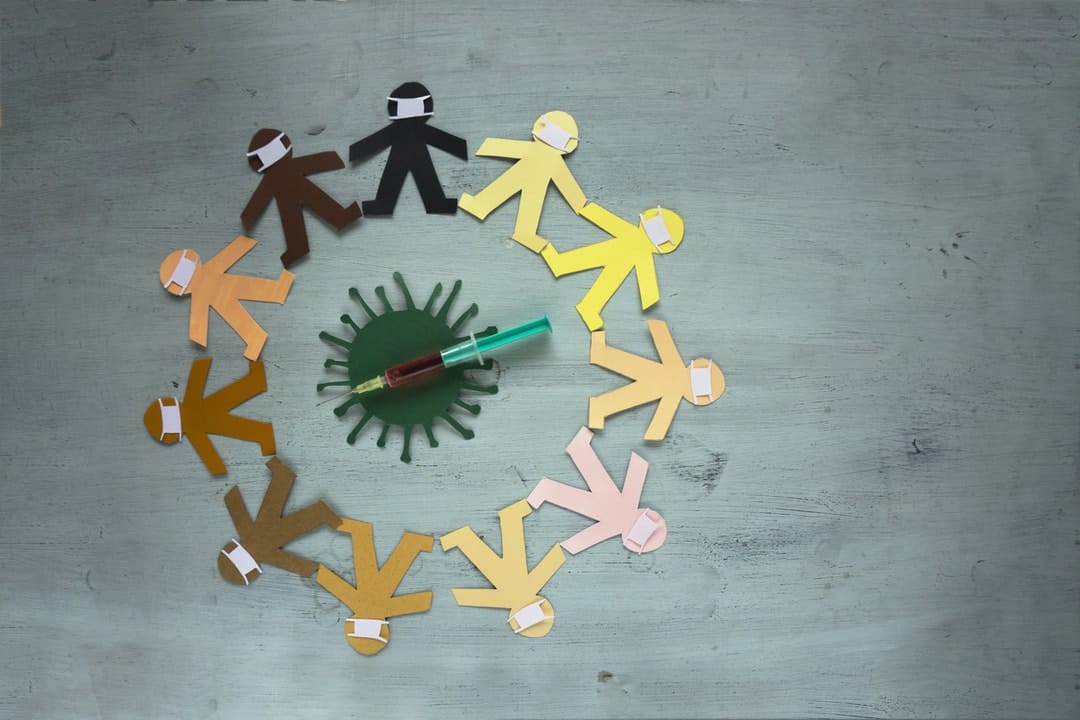
During Melbourne’s long lockdown last winter, it was apparent that newly-arrived immigrants and refugees were particularly vulnerable to contracting COVID-19.
Religious and community leaders from the city’s culturally and linguistically diverse (CALD) communities stepped up to help the Victorian government manage the health emergency. They worked tirelessly to persuade compatriots from 260 language groups to stay home, take COVID tests, and wear masks.

The behind-the-scenes effort was massive and intense, and its success has been applauded internationally, says health and social care improvement and implementation science specialist Helen Skouteris.
The lessons learned during 2020 will now be applied to the equally challenging task of encouraging Australians to take a COVID vaccine, she says.
“There’s still a long road ahead of us, but we appear to be heading in the right direction.”
Australia is extremely well-placed to implement a successful vaccination program, she believes. And that's because – so far – most of us have willingly complied with lockdown, social distancing and mask-wearing rules, even if we also grumble privately about the inconvenience.
“The reality is, we don't have those huge numbers of deaths. We don't have community spread at the moment,” she says.
But she also says that conventional government information campaigns with TV ads and posters won’t not be enough to persuade anxious Australians to have their COVID vaccine shot.
“We know that information alone, knowing what to do, doesn’t translate into the real world, which is very, very complex,” she says.
“... it’s time now to focus on supporting Australians, especially those from non-English-speaking and vulnerable backgrounds, to understand the importance of vaccination, from their own cultural and social perspectives.”
Evidence-based human behaviour research, “when we're wanting humans to change their behaviour to potentially do something that they struggle with”, has taught her that targeted responses are required.
Even before COVID struck, scepticism about vaccines – any vaccine – was spreading in Australia and elsewhere. COVID-specific conspiracy theories have added another layer of difficulties, with CALD community members as prone to receiving misinformation as anyone else.
CALD community leaders are represented on the CALD Communities COVID-19 Health Advisory Group, a committee Professor Skouteris also sits on, and are “helping with the co-design and the participatory nature of the communications”.
One difficulty they face is that if people “get their communication from overseas that might not necessarily be in accordance with, and aligned to, what we’re doing here”, she explains.
“So it’s about working constructively, rigorously, and also systematically in a participatory manner, because these things take time.”
Read more: COVID-19: Age-old preventive measures still needed even after coronavirus vaccination rollout
How do we persuade those among us who may have grave misgivings about the AstraZeneca vaccine for instance, which has been associated with a rare blood clotting disorder?
“How do we translate that information into the homes of the average Australian person, who will never have read a Lancet paper, will not understand the findings of a randomised controlled trial, will not understand that you can expedite vaccine efficacy?” Professor Skouteris says.

Some of our citizens have arrived from countries where government information is not trustworthy, and are therefore sceptical about any “official” health advice. On the other hand, Australia’s COVID-free status, and the news about what’s going on overseas may help to counterbalance that scepticism.
And then there are those who argue that any vaccine is unnecessary because the COVID-19 danger has been overblown and will pass. As is the case with vaccine scepticism, this view is not confined to CALD community members. It may also be subject to change as COVID continues to take a toll elsewhere.
The effectiveness of the vaccine against the emerging COVID variants also complicates the communication strategy, Professor Skouteris says.
“Then there’s the different chronic diseases that people are living with,” she says. People with diabetes, and/or who are living with obesity are all considered vulnerable to COVID-19, for instance, and these conditions can be more prevalent in low-income groups.

“So many things that you have to think about,” she says. “Recommendations for whether pregnant women should be vaccinated are emerging, as they are for women planning a pregnancy and breastfeeding. It’s always best to consult with your doctor first.”
Her view is that, because the issues are complex and still evolving, it may take several years to truly manage COVID-19.
“There’s still a long road ahead of us, but we appear to be heading in the right direction,” she says.
Professor Skouteris also worked with Australia’s Group of Eight universities to help prepare their Roadmap to Recovery document – she was responsible for the chapter concerning vulnerable communities.
“Every single one of our recommendations needs vast and complex implementation-science methodology,” she says.
Attending to the particular needs of vulnerable groups will take time, but our attention is crucial, because they’re the ones who face the greatest risk of physical, social and economic disadvantage as a result of COVID-19.
“For me, it’s about acknowledging that, yes, we’ve been through really tough times, but it’s time now to focus on supporting Australians, especially those from non-English-speaking and vulnerable backgrounds, to understand the importance of vaccination, from their own cultural and social perspectives, by providing and implementing evidence-based and co-designed tailored, meaningful and applicable communication strategies and advice,” she says.





